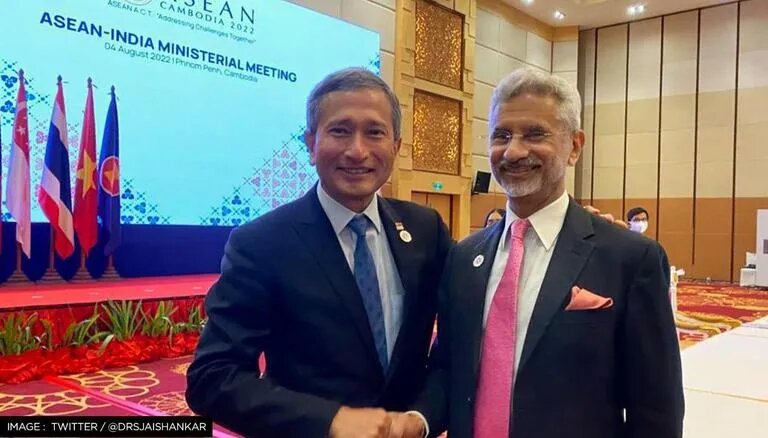Vivian Balakrishnan, the Foreign Minister of Singapore, lauded India for its digital identity and payment systems and claimed that it presents a “clear opportunity” for the country.
In the statement following his meeting with Indian External Affairs Minister S Jaishankar in Cambodia, Balakrishnan emphasised two key areas in his remarks, highlighting some of India’s strengths and economic integration.
“India has certain strengths – FinTech, digital finance, digital inclusion, and what they have done with digital identity and payment systems, is a clear opportunity for us,” the Singaporean Foreign Minister Balakrishnan said.
“In Singapore, of course, we have all those systems as well, but for the rest of Southeast Asia, to explore how we can interconnect our payment systems, our financial systems, in order to facilitate payments and expand opportunities for small businesses across the subcontinent and across into Southeast Asia,” he added.
Moreover, Balakrishnan said: “We are reviewing the ASEAN-India Trade in Goods Agreement to facilitate trade to facilitate customs clearance and to reduce the friction for the movement of goods between the Indian subcontinent and Southeast Asia. We have got quite a lot of work there.”
The Singaporean foreign minister added that he had the opportunity to meet Jaishankar twice in the previous few months and that there would be other interactions in the near future. See here.
https://twitter.com/sidhant/status/1555962159229595648
India and Singapore have long-standing ties that have their roots in mutually beneficial trade, cultural exchanges, and human interactions across a millennium. See here.
India-Singapore relations are built on common values and perspectives, the potential for economic cooperation, and the convergence of views on critical issues. Political engagement between these two countries has been fairly regular.
The defence relations between these countries are exceptionally strong. The economic and technological ties are widespread and strengthening.
Both countries have strong ties on a cultural and interpersonal level. There are more than 20 bilateral mechanisms; discussions and exercises take place regularly. Both countries share a great deal of common ground on a wide range of global issues, and they are both participants in a number of forums, including the East Asia Summit, G20, Commonwealth, IORA (Indian Ocean Rim Association), and IONS (Indian Ocean Naval Symposium).
Singapore is India’s sixth-largest trade partner (2020–21), accounting for 3.2% of total trade. In 2021-22 (April-September 2021), bilateral trade was worth USD 14.2 billion.
Bilateral trade between these two countries was valued at USD 21.98 billion in 2020-21. Singapore’s cumulative FDI inflows to India totalled USD 118.39 billion between April 2000 and June 2021, accounting for 22% of total FDI inflows to India.
In 2018, India and Singapore added new momentum and direction to their strategic partnership, anchored by Prime Minister Narendra Modi’s official visit to Singapore from May 31 to June 2, and his subsequent visit on November 14–15 to attend the ASEAN-India and related summits.
Lee Hsien Loong, the prime minister of Singapore, also travelled to India from January 25 to 26, 2018, to co-chair the 2018 ASEAN India Commemorative Summit (AICS) and take part in Republic Day celebrations in New Delhi.
PM Lee was one of the six world leaders who were invited by PM Modi to speak at a special event at the United Nations in New York on September 24, 2019, to commemorate Mahatma Gandhi’s 150th birth anniversary.
Singapore was India’s most important source of FDI in 2018-19, 2019-20, and 2020-21.
Due to Singapore’s position as a logistical hub, both the public and private sectors were able to obtain emergency relief supplies from Singapore to India, including oxygen tanks, cylinders, concentrators, and ventilators, during the second wave of the pandemic. Significant quantities of these items were transported from Singapore to India by 26 Indian Air Force sorties and 4 Indian Navy ships through the end of June 2021.













